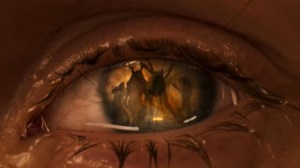Marvel has released the third chapter of its documentary chronicling the seminal moments in X-Men history. This chapter look at Age of Apocalypse, the universe-changing event from the 1990s. “The premise of the Age of Apocalypse is it’s a world where Charles Xavier never existed, or Charles Xavier’s life is prematurely ended,” sales executive Sven Larsen explains. “His son, Legion, end up going back in time, accidentally killing him, and as a result, with no Charles Xavier, there’s no one to stop the rise of Apocalypse.”
Videos by ComicBook.com
Larsen also notes that Marvel, at the time, had gotten into the habit having an X-Men crossover every year. Often, these would be frustrating for the creative talent as it interrupted their individual stories, but Larsen says Age of Apocalypse was different. The idea was so exciting that everyone was eager to be involved.
“I liked the idea of our heroes fighting for a very apocalyptic future,” recalls Jeph Loeb, the current head of Marvel Television who was a Marvel Comics writer working on Age of Apocalypse at the time. “You’re trying to save the world, but the world’s all destroyed, so what are you really fighting for? And what you’re really fighting for is humanity.”
Another thing that set Age of Apocalypse apart was that instead of taking place in the ongoing X-Men titles, all of those titles were suspended and replaced with Age of Apocalypse titles for four months. “This was a Marvel who, at that point, was a very successful publishing company, had a great role in the market but was still willing to shake things up creatively and take these kinds of risks with what at that point was our bestselling franchise,” says Larsen.
“The audacity of just stopping the entire line and not letting you know that it was ever coming back; we were gobsmacked by this idea,” says Mark Waid, who wrote the Age of Apocalypse bookend issues Age of Apocalypse: Alpha and Age of Apocalypse: Omega. “We have a half a dozen super successful books that are carrying the line. Let’s just cancel those for four months.”
This drastic approach offered creative opportunities that often weren’t present in these kinds of crossover productions. “It meant anything goes,” Loeb says. “Anyone could die. Anyone could fall in love. Any way we wanted to change it up. Everything you came to know and love about the X-Men, out the window.”
“I think it was a little bit a borrowing of the Mad Max paradigm of ‘This is a darker world, it is a less polished world, so let’s reflect that in the way the costumes look and the way the characters carry themselves,’” says Waid.
“The Age of Apocalypse, while its not Xavier’s dream of humans and mutants coexisting peacefully, it is Magneto’s dream, it’s a lot of mutants dreams of like, ‘Us on top, humans on the bottom,’ and it’s one of those ‘careful what you wish for’ things,” Larsen says.
What did you think of Age of Apocalypse? Let us know in the comments.
A new era of X-Men begins with House of X and Powers of X, two new miniseries being called the next seminal moment in X-Men history. For more information, check out our interview with writer Jonathan Hickman.








